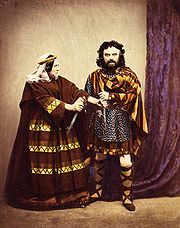Charles John Kean 1811 - 1868
May 21, 2009
 Charles John
Kean 1811 - 1868 was born
at Waterford, Ireland, the son of the actor Edmund
Kean.
Charles John
Kean 1811 - 1868 was born
at Waterford, Ireland, the son of the actor Edmund
Kean.
Charles Kean was an advocate of homeopathy, and he consulted homeopath Dr. Angel on his American tour. Kean was also a friend of James John Garth Wilkinson (Autograph letter signed from J.J. Garth Wilkinson, St. John’s Wood, to Charles J. Kean, (1855)).
Charles made his first appearance at Drury Lane on 1 October 1827 as Norval in John Home’s Douglas, but his continued failure to achieve popularity led him to leave London in the spring of 1828 for the provinces.
In Glasgow, on 1 October in that year, father and son acted together in Arnold Payne’s Brutus, the elder Kean in the title part and his son as Titus.
After a visit to the United States in 1830, where he was received with much favour, he appeared in 1833 at Covent Garden as “Sir Edmund Mortimer” in George Colman’s The Iron Chest, but his success was not pronounced enough to encourage him to remain in London, especially as he had already won a high position in the provinces.
In January 1838, however, he returned to Drury Lane, and played Hamlet with a success which gave him a place among the principal tragedians of his time. He was married to the actress Ellen Tree (1805-1880) on 25 January 1842, and paid a second visit to America with her from 1845 to 1847.
Returning to England, he entered on a successful engagement at the Haymarket, and in 1850, with Robert Keeley, became lessee of the Princess’s Theatre, London. The most noteworthy feature of his management was a series of gorgeous Shakespearean revivals that aimed for “authenticity”.
Kean also mentored the young Ellen Terry in juvenile roles. Charles Kean was not a great tragic actor. He did all that could be done by the persevering cultivation of his powers, and in many ways manifested the possession of high intelligence and refined taste, but his defects of person and voice made it impossible for him to give a representation at all adequate of the varying and subtle emotions of pure tragedy.
But in melodramatic parts such as the king in Dionysius Lardner Boucicault’s adaptation of Casimir Delavigne’s Louis XI, and Louis and Fabian dei Franchi in Dionysius Lardner Boucicault’s adaptation of Dumas’s The Corsican Brothers, his success was complete.
From his “tour round the world” Kean returned in 1866 in broken health, and died in London on 22 January 1868 at the age of 57. He is buried at Horndean, Hampshire